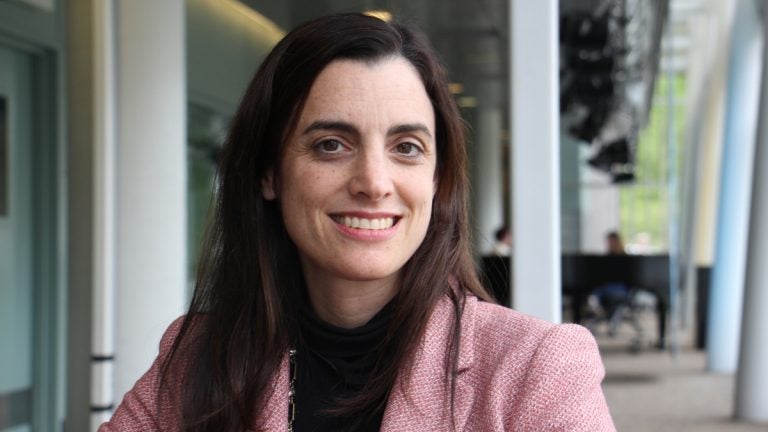Philly’s $1.6 billion Department of Behavioral Health under review
City Controller Rebecca Rhynhart starts a performance audit with Department of Behavioral Health because it funds services she thinks Philadelphians need most.

Philadelphia City Controller Rebecca Rhynhart (Emma Lee/WHYY)
Philadelphia’s new City Controller Rebecca Rhynhart doesn’t mince words. The cover of her day planner reads, “Getting Sh*t Done,” and she plans to do just that. She has made auditing the Department of Behavioral Health and Intellectual disAbilities Services one of her first priorities. The $1.6 billion department contracts with more than 200 private and nonprofit agencies and, according to Rhynhart, has never been subject to a full performance review.
Rhynhart chose to start with the Department of Behavioral Health because it funds the services she thinks Philadelphians need most — opioid addiction-treatment centers and programs for people affected by gun violence. The broad scope of programs the department oversees does seem hard to measure — everything from screening for kids with developmental delays to long-term residential centers for those with substance abuse disorders.
“Some of the best therapy takes many, many years,” said Rhynhart. “There’s no quick successes in this area, that’s understandable. But we do need to make sure that there’s at least a correlation between a provider that hasn’t had positive outcome and the amount of money going there.”
David Mandell heads the Center for Mental Health Policy and Services Research at the University of Pennsylvania, which has helped the city evaluate its behavioral health programs for 30 years. Measuring these programs, especially in the midst of a public health crisis like the opioid epidemic, is essential, he said.
“It should be part of the way we construe an ethical commitment to quality care to be measuring outcomes,” said Mandell. There are three questions Rhynhart and her team can ask to help quantify even the most qualitative of programs, he said.
The first is whether the program is reaching the right people.
“How many of them are there, and what proportion of them are we able to enroll in our program?” he said.
The second question would be if patients are getting evidence-based care, or whether providers are implementing the best practices in the field.
And third, like any review, would be outcomes.
Again, Mandell said, while it may seem difficult to measure, this too can be operationalized across the board.
“Are symptoms reducing? Is functioning improving? Is people’s integration into their communities increasing? I think this is something we could ask of every program, and it also allows us to compare programs to each other,” said Mandell.
Alongside reviewing how effective the services are, much of what Rhynhart has said her office will examine will be process oriented — specifically how providers are selected and how a given provider’s funding is determined.
Rhynhart said that she has heard, anecdotally, of misspending in the department. If the audit finds that to be the case, she may recommend that funding be shifted around. With $1.6 billion worth of contracts, that’s bound to upset some service providers.
“Well, look, whenever there’s a lot of money involved, it shakes someone up,” she said. “But to me, my job is not about what political person or business person is unhappy, it’s about how do we help the largest number of people in our city.”
Officials from the Department of Behavioral Health declined to comment, because the audit is already underway. Rhynhart expects the process will take about five more months.
WHYY is your source for fact-based, in-depth journalism and information. As a nonprofit organization, we rely on financial support from readers like you. Please give today.





